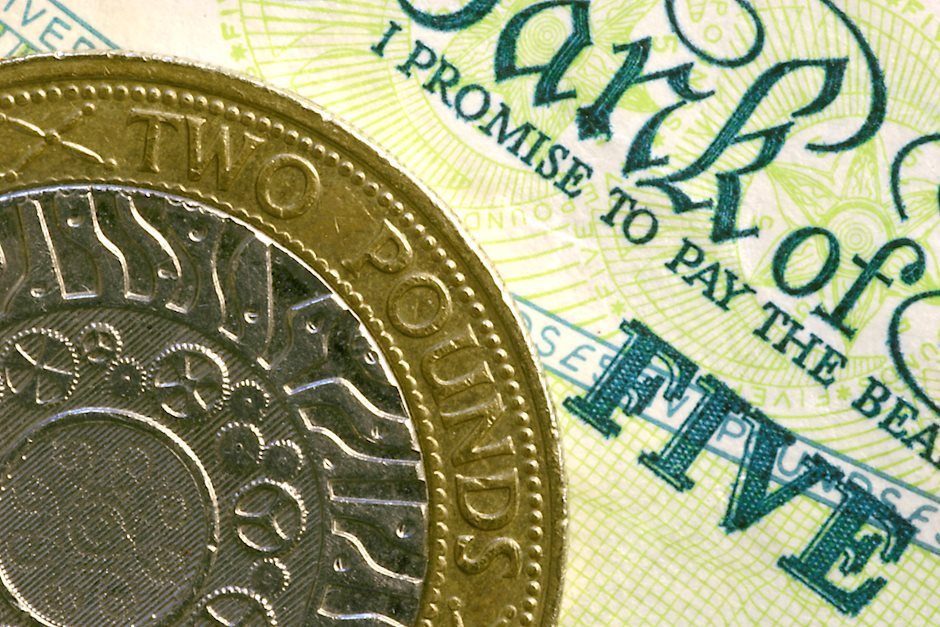Pound Sterling extends upside as soft US core PCE report cheers market mood
- Pound Sterling rises after the US core PCE price index remains in line with estimates.
- Investors shift focus to the BoE policy, which is expected to remain unchanged at 5.25%.
- BoE policymakers may struggle to understand persistent inflation amid novel labor market data collection methods.

The Pound Sterling (GBP) recovers sharply against the US Dollar as market sentiment improves after a steady US core Personal Consumption Expenditure (PCE) price index report for September. The near-term outlook of the GBP/USD pair remained weak as the United Kingdom economy is facing the wrath of higher interest rates by the Bank of England (BoE) amid stubborn consumer inflation.
Business activities, labor demand, and sales at retail stores have dropped significantly as high inflation has squeezed household budgets. The inflation risks remain persistent due to robust wage growth, which has cast doubts among market participants about UK Prime Minister Rishi Sunak fulfilling his promise of halving headline inflation to 5.4% by the year-end.
Going forward, investors will keenly watch the interest rate decision by the BoE, which will be announced on November 2. The BoE is widely anticipated to keep interest rates unchanged at 5.25%.
Daily Digest Market Movers: Pound Sterling jumps after steady US core PCE report
- Pound Sterling aims to surpass the crucial resistance at 1.2140 against the US Dollar as the latter retreats after the US core PCE price index remains in -line with estimates.
- Federal Reserve’s (Fed) preferred inflation gauge rose at a higher pace of 0.3% as expected against the nominal increase of 0.1%, recorded in August. The annual core PCE inflation data decelerated to 3.7%, in line with estimates, from the August reading of 3.9%.
- The Pound Sterling will dance to the tunes of the monetary policy decision by the Bank of England on November 2 in which it is expected to maintain the status quo.
- Poor business activity, deteriorating labor market conditions, and weak consumer spending would be the major catalysts behind an unchanged interest rate decision by the BoE. In addition, deepening Middle East tensions could pose a threat to high energy prices.
- The UK inflation is extremely far from the desired rate of 2%. Therefore, BoE policymakers are expected to emphasize keeping interest rates higher for a longer period and will keep doors open for further policy tightening.
- In September, the headline and core inflation were recorded at 6.7% and 6.1%, respectively, which were almost unchanged from August’s inflation report.
- The inflation in the UK region is highest in comparison with other G7 economies, which could force BoE policymakers to discuss one more interest rate hike ahead.
- The decision-making process by BoE policymakers in the November meeting is expected to be a tough one due to the replacement of the household survey method for calculating labor market data with an experimental one derived from tax and state benefit figures.
- The UK Office for National Statistics (ONS) delayed Employment Change, Unemployment Rate, and Claimant Count Change data in October as the usual data collected by the Labor Force Survey (LFS) was insufficient due to lower response rates.
- At a time when policymakers are heavily dependent on incoming data for policy decision-making, less confidence in unconventional methods of data collection may create difficulties in understanding persistent consumer inflation.
- The major agenda of policymakers is expected to be building a roadmap to curtail robust wage growth, which has been keeping price pressures elevated.
- The Citi Bank reported this week that 12-month forward consumer inflation expectations will ease to 4.2% in September from 4.4% in August.
- The broader market sentiment remains downbeat as Israeli troops have gradually entered Gaza and are preparing for a full-scale incursion assault on Hamas.
- Meanwhile, Hamas officials have urged their allies for intervention to demolish the Israeli army upon entering Gaza.
- The US Dollar Index (DXY) looks set for a bullish weekly close, supported by heavy demand for safe-haven assets amid Israel-Hamas tensions and upbeat US economic data.
- The US Bureau of Economic Analysis (BEA) reported on Thursday that the economy grew at an annualized rate of 4.9% in the July-September quarter after the 2.1% expansion recorded in the second quarter's GDP report. Investors forecasted that the US economy expanded by 2.1% in the third quarter of 2023.
Technical Analysis: Pound Sterling climbs to near 1.2160
Pound Sterling delivers a break above the crucial resistance of 1.2140. The GBP/USD aims to extend recovery as the market sentiment improves due to selling pressure on the US Dollar. The near-term trend remains bearish as the 20 and 50-day Exponential Moving Averages (EMAs) are slowly moving south. A breakdown below Thursday’s low may expose it to psychological support at the 1.2000 round number.
Pound Sterling FAQs
What is the Pound Sterling?
The Pound Sterling (GBP) is the oldest currency in the world (886 AD) and the official currency of the United Kingdom. It is the fourth most traded unit for foreign exchange (FX) in the world, accounting for 12% of all transactions, averaging $630 billion a day, according to 2022 data.
Its key trading pairs are GBP/USD, aka ‘Cable’, which accounts for 11% of FX, GBP/JPY, or the ‘Dragon’ as it is known by traders (3%), and EUR/GBP (2%). The Pound Sterling is issued by the Bank of England (BoE).
How do the decisions of the Bank of England impact on the Pound Sterling?
The single most important factor influencing the value of the Pound Sterling is monetary policy decided by the Bank of England. The BoE bases its decisions on whether it has achieved its primary goal of “price stability” – a steady inflation rate of around 2%. Its primary tool for achieving this is the adjustment of interest rates.
When inflation is too high, the BoE will try to rein it in by raising interest rates, making it more expensive for people and businesses to access credit. This is generally positive for GBP, as higher interest rates make the UK a more attractive place for global investors to park their money.
When inflation falls too low it is a sign economic growth is slowing. In this scenario, the BoE will consider lowering interest rates to cheapen credit so businesses will borrow more to invest in growth-generating projects.
How does economic data influence the value of the Pound?
Data releases gauge the health of the economy and can impact the value of the Pound Sterling. Indicators such as GDP, Manufacturing and Services PMIs, and employment can all influence the direction of the GBP.
A strong economy is good for Sterling. Not only does it attract more foreign investment but it may encourage the BoE to put up interest rates, which will directly strengthen GBP. Otherwise, if economic data is weak, the Pound Sterling is likely to fall.
How does the Trade Balance impact the Pound?
Another significant data release for the Pound Sterling is the Trade Balance. This indicator measures the difference between what a country earns from its exports and what it spends on imports over a given period.
If a country produces highly sought-after exports, its currency will benefit purely from the extra demand created from foreign buyers seeking to purchase these goods. Therefore, a positive net Trade Balance strengthens a currency and vice versa for a negative balance.
Author

Sagar Dua
FXStreet
Sagar Dua is associated with the financial markets from his college days. Along with pursuing post-graduation in Commerce in 2014, he started his markets training with chart analysis.

















